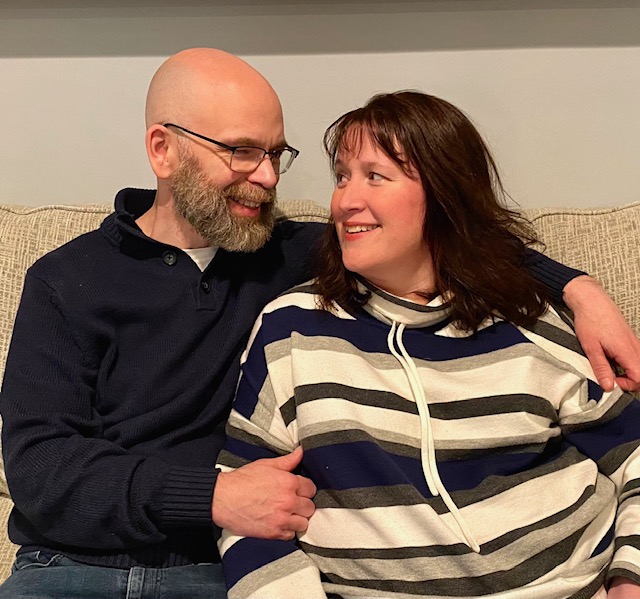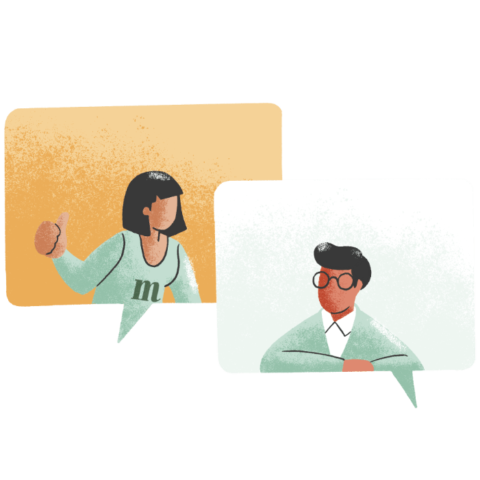On our most recent LinkedIn Live broadcast, we featured Jennifer and Dan Digmann, two of our patient experts in MS. Jennifer was diagnosed with multiple sclerosis in 1997 and has secondary-progressive MS; Dan was diagnosed in 2000 and has relapsing-remitting MS.
Their inspirational stories of life, love, and overcoming adversity are shared via their blog and podcast - A Couple Takes on MS - and video content on their YouTube channel. Their book, "Despite MS, to Spite MS," was published in 2015, and they were inducted into the National MS Society's Volunteer Hall of Fame for advocacy.
In this post, we share some highlights from our engaging conversation with the Digmanns. The full video replay of the conversation is available on our YouTube channel.
Dan and Jennifer began by sharing the story of how they met at a National Multiple Sclerosis Society event in 2002.
“Dan is adorable and instantly I felt very comfortable,” said Jennifer. “I wasn't able to walk and I started using a wheelchair, so I was still a little uncomfortable, and Dan made me feel comfortable and there was nothing to be embarrassed about. And he's a great guy to begin with, but then he understood my experience that much more and I felt very comfortable and we just hit it off that day. And we've been together ever since."
As both caregivers and patients with the same condition, the couple talked about how they support one another.
“I think patience is so important,” explained Jennifer. “And that's interesting because you're a patient, but you need to be patient. And so when something happens, if it's frustrating, I always try and stop, take a breath, and then I try not to react. And I'm a little fiery like that. Sometimes I react, but Dan is a little more patient, and I would say that's important.”
Dan agreed with Jennifer, adding, “it's just understanding and being alert to what's going on around you and not being selfish about things. I think that's the big thing is just always being empathetic, always being there for the team, not for yourself.”
He went on to describe how “it’s almost like who's got a bad and who has a worse day today. Who's going to be the patient? Who's going to be the caregiver? And it's sometimes moment by moment, day by day. If I'm helping Jennifer transfer, if something goes wrong, well then all of a sudden she's the one you focus on. And then other times, if I fall or something, then I'm the patient.”
“And always be honest,” added Jennifer. “ If Dan's having a bad day and I'm having a bad day, we have to communicate that. You don't want to be honest to the point that you hurt the other person's feelings, but you need to be honest. And we use the team metaphor quite often. I don't know if it's because we're from the Midwest, but we have to remember that we're on the same team. And so I think that that really gives us that strength to persevere and just be patient and kind.”
“We always say you need to be your own best advocate because nobody else knows your situation better than you,” explained Dan. “For me, I'm there to advocate for myself. But what makes it easier for me is knowing I'm doing it for somebody else. I feel if I'm advocating for myself, that feels very selfish, so to be able to advocate for others is a pretty big deal. It's pretty special that way.”
For Jennifer, advocacy gives her purpose and strength. “I haven't walked in over 20 years. And that's a huge part of your life. And you can feel very down and very sad and very weak,” she said, “but by advocating, there is so much strength in my story and linking up with my community. And I think that gives you back that piece that may be missing. And here in the United States, we meet with legislators. That feels powerful. Sharing my story, talking about increased access to medication, lowering prescription drug prices, as you make it not so much about yourself, you're helping other people living with your condition.”
Jennifer went on to say, “ I do think advocacy makes both Dan and I feel there is a reason we were diagnosed with multiple sclerosis. And this is part of it to help other people. You know, the patient journey is talked about so often, but our journey includes other people here in the United States. There are nearly a million people diagnosed with MS, and I believe it's 2.5 worldwide.”
Dan spoke about the power of sharing our stories, describing stories as “a springboard to then be able to talk to other people or talk for other people.”
“You open up so much in conversations, and you're talking to other people with multiple sclerosis or whatever condition you're living with, “ he said. “And then all of a sudden you don't feel so isolated, you don't feel so alone, because you see many other people who know exactly what you're dealing with. And so that gives you power to know you're not alone.”
Speaking about the power of social media to amplify stories and advocacy, Jennifer said, “You know, social media makes the world a much smaller place and when you share stories about your life and details, you instantly become friends with the people you connect with. And, you know, during the pandemic, it was so nice to have that support when you couldn't have it in person. You can share those warm connections with people across the country, across the world now.”
Dan spoke about the instantaneous nature of social media and the power to build a network and create community. “You put something up there and it's building the network, building the community. You talk about in the business world, it's all about making connections and networking - not that having a chronic illness is a business - but at the same time, you're building that network, you're building the community, and then all of a sudden I'm having this issue and I don't have to wait around to talk to my neighbors. I don't have to wait for a monthly support group that I go to in person. I can throw it out there on Facebook, on Twitter, on Instagram, whatever. There are many, many different ways to throw the stories out there to get answers to your questions or just to make people realize that these are the things you're dealing with. So then, if others are dealing with it, they have instant access to you.”
Giving advice to those who may feel overwhelmed by social media, Jennifer brought the discussion back to sharing stories. “With social media, with anything, it's sharing your story. You start writing a letter to the editor or sharing your story on Instagram. How do you eat an elephant? You know, little bites. Start small with things locally and with your smartphone. I don't use my right hand to type, like when a lot of Zoom conversations are going on I don't participate in the typing, but I can talk. And with voice recognition I can say things. So just find how you can communicate if you can make it accessible for you.”
Dan agreed that it’s smart to start small. “We've been married for 17 years. It started small. We had a blog. You just keep adding and getting good at this,” he said. “We just added a podcast a year and a half ago, and yeah, it takes a lot of work to do this stuff, but then carve out the time, pace yourself and don't overwhelm yourself with it.”
“And surround yourself with people,” added Jennifer. “Our podcast producer, Ryan, helps us to get our content up there and our support group, whether it be in person or online, we're just surrounded by so many people that can help us and share the load.”
Our conversation then turned to the words we use to tell our stories and how the words we choose may not always resonate with others.
“You choose your words, you think of the audience, think of other people,” said Dan, “but at the same time, you have to be authentic to yourself, authentic to you. And I really think that's where part of the thing that we all have to do is just understand where the person is coming from. And if I use a term that's comfortable for me as a patient, then I would hope, if I respect that if others come to me and say that they're not comfortable with that term, I can understand that. But then you just hope that they give me the latitude and understanding that's me.”
As our conversation came to an end, we discussed how the MS narrative is changing.
“Back when Dan and I were diagnosed, the narrative was, don't exercise, don't overdo. There wasn't the emphasis on diet and well-being, and the medication that was available was nowhere like it is now,” explained Jennifer. “And so I think the narrative has changed in that the patient has so much more power and multiple sclerosis is not an easy disease to live with, but it's so much more manageable. And it's something where you can live a quality life. And the story isn't just that I'm going to end up in a wheelchair. And if you do end up in a wheelchair like me, it's not like, oh goodness, my life is over kind of thing. So I think that that is changing. And I think younger people that are diagnosed or newly diagnosed people, they have such a different a different experience than we had 25 years ago. And so that's powerful.”
Dan wants to ensure that those who have been living with MS for many years are also included in the narrative. “The narrative needs to continue to incorporate and include people who have had the disease longer,” he said. “We're hoping and trying to change the narrative, to have positive stories. I want to show how much attitude makes a difference. There are a lot of things you can't control with the disease, but it's your perspective and outlook because I didn't give up after I was diagnosed. And you know what? Two years later, I met Jennifer.”
To watch the video recording of this conversation please visit In Conversation with Dan and Jennifer Digmann: A Couple Takes On MS - YouTube


✕